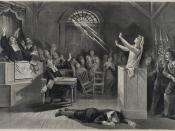The Crucible
The people of Salem can hardly be condemned for their actions during
the witch hunts of 1692, as described in the play The Crucible, for they were
merely products of their time. This is shown through an examination of the
theocratic society in which they lived, the patriarchal snobbery they
exhibited toward each other, their lack of medical technology and in depth
knowledge of disease and of an analysis of the fear they displayed of the
unknown. This is important as it shows that the Salemites were not entirely
evil people, for they were only reacting to a situation in the only suitable
manner they knew.
At the time of the witch hunts, the Salemite's society was an organized
theocracy in which their Puritan church ruled. It was instilled to ensure
moral order and justice within Salem and 'to prevent any disunity that might
open it to destruction by material or ideological enemies'.
While espousing
purity and godliness, the Puritans of Salem were a political group with
leanings toward power and weakness. They were unable to keep these two
characteristics in check at the time of the witch hunt. This resulted in the
witch hunts becoming 'a perverse manifestation of the panic which set in
among all classes when the balance began to turn toward greater individual
freedom'. Their theocracy allowed for no expression of individuality, lest the
individual, in short, ask for public condemnation. The theocracy of the
Salem society at the time was an enormous factor to the conditions
surrounding the witch hunts.
The Salemites exhibited patriarchal snobbery toward each others and
those who were different. 'Their church found it necessary to deny any other
sect its freedom, lest their New Jerusalem be defiled and corrupted by wrong
ways and deceitful ideas.'. As Puritans, felt they...


